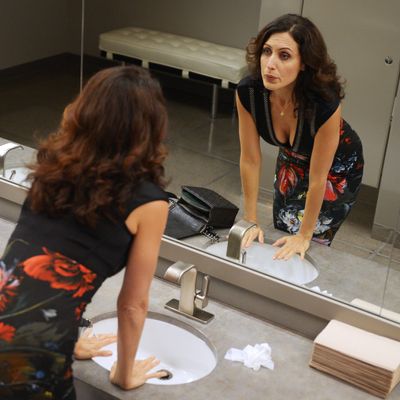
Did you know that the perfect peoplesÔÇÖ lives are never quite as perfect as they seem? And that some people who make a living promoting lifestyle brands are often themselves simply husks performing a happy life while their interiors rot from artificiality? I did know, partially because IÔÇÖm a cynical monster and partially because, well, look around. This whole stupid world is full of quiet (and often not quiet) desperation, and often the most desperate are the most ostentatious about seeming happy. People who want to tell you whatÔÇÖs wrong in your life are trying to sell you something, and you donÔÇÖt have to have seen every Mad Men to know that people trying that hard to sell you something are probably trying to sell it to themselves. Abby (Lisa Edelstein), our heroine on GirlfriendsÔÇÖ Guide to Divorce, does not have the perfect life she claims to have in her self-help books. Well, no shit.
The show, touted as BravoÔÇÖs first scripted series (sorry, Significant Others), follows what one assumes will be the dissolution of AbbyÔÇÖs marriage, which sheÔÇÖll get through with a little help from her friends, namely a wealthy lawyer herself entangled in a frustrating divorce (Janeane Garofalo) and a free-spirited former model (Beau Garrett). All three have children who go to the same froufy school, but now Abby has befriended them in divorc├®e solidarity. They shop and talk about sex, the way girlfriends do. AbbyÔÇÖs downward spiral is compounded with professional fallout when she confesses at a book signing ÔÇö for a book claiming to help women get their grooves back ÔÇö that she sometimes wishes her husband would just die. This is met with shock and contempt in the room, and later Hoda and Kathy comment on it on TV, as if it is a sentiment no one has expressed before. Except lots of people have, including Judd Apatow, repeatedly, in This Is 40. No one really cared! ÔÇ£Murder, yes; divorce, noÔÇØ is practically a ReaderÔÇÖs Digest joke. ItÔÇÖs not funny, really, and itÔÇÖs not particularly original. If this is AbbyÔÇÖs shocking truth-telling moment, it doesnÔÇÖt quite work; the story line hung on the idea that everyone is scandalized by this seems contrived.
Weirdly, the show is at its best when itÔÇÖs at its nastiest, in its most cruel and cutting fight scenes. If IÔÇÖm gonna watch a show about people getting divorced, I want to really get how divorce-y everything is. GarofaloÔÇÖs Lyla and her ex Dan brutally go after each other, and Abby and Jake (Paul Adelstein) seem the most like an actual couple when theyÔÇÖre saying awful things to each other. You can bang anyone, but only someone who really knows you can say that one thing. Creator Marti Noxon is famous for her emotionally charged episodes of Buffy, among other things, and when GGTD is raw, that potency comes through.
But when everyoneÔÇÖs just farting around, the show loses its impact. IÔÇÖm not saying rich people donÔÇÖt have problems┬áÔÇö though, uh, if you want to trade, give me a jingle ÔÇö but hearing Abby and her husband argue about whether a $4,500-per-month apartment for him is going to be too expensive, or a teary moment where Abby promises her housekeeper that her job is safe, itÔÇÖs hard for me not to pray for the class wars. Their living-room furniture could put a kid through college. ItÔÇÖs on Bravo for a reason ÔÇö weÔÇÖre supposed to find the wealth ennobling, I think? But money really canÔÇÖt buy you happiness, because a major anxiety on the show is the threat of somehow having to move from insanely rich to just regular rich. Both Abby and Lyla aggressively resent possibly paying alimony to their ex-husbands, even though both husbands were full-time parents when their respective children were little. This attitude goes largely unchallenged, and thereÔÇÖs a frequent refrain in the first two episodes about the having and not having of balls, and growing your balls back, and finally ÔÇ£sackingÔÇØ up, and balls balls balls balls balls. If the show is trying to reflect the social drawbacks of rejecting traditional gender roles, itÔÇÖs not doing a very good job.
The characters on GGTD are, for the most part, pretty smart, and their frustrations are well articulated and vivid. Divorce, IÔÇÖm told, involves anger, distress, self-recrimination, and a not insignificant amount of genuine grief. ThatÔÇÖs the part the show seems to nail. Everything else, though, has been done better elsewhere. The bragging about oneÔÇÖs perfect breasts and sexual exploits is Samantha Jones redux; a fraught shabbat prayer was just done with so much more emotion on Transparent; the anxiety about men dating much younger women is more potent when Nancy Meyers wraps a pashmina around it. ItÔÇÖs not that I want to watch everyone on GGTD suffer, itÔÇÖs just that the suffering is the showÔÇÖs strong suit.

